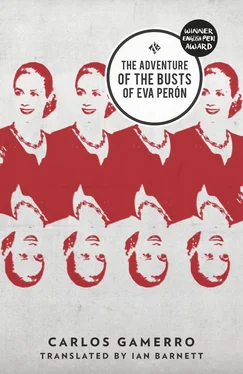Carlos Gamerro - The Adventure of the Busts of Eva Perón
Здесь есть возможность читать онлайн «Carlos Gamerro - The Adventure of the Busts of Eva Perón» весь текст электронной книги совершенно бесплатно (целиком полную версию без сокращений). В некоторых случаях можно слушать аудио, скачать через торрент в формате fb2 и присутствует краткое содержание. Год выпуска: 2015, Издательство: And Other Stories, Жанр: Современная проза, на английском языке. Описание произведения, (предисловие) а так же отзывы посетителей доступны на портале библиотеки ЛибКат.
- Название:The Adventure of the Busts of Eva Perón
- Автор:
- Издательство:And Other Stories
- Жанр:
- Год:2015
- ISBN:нет данных
- Рейтинг книги:3 / 5. Голосов: 1
-
Избранное:Добавить в избранное
- Отзывы:
-
Ваша оценка:
- 60
- 1
- 2
- 3
- 4
- 5
The Adventure of the Busts of Eva Perón: краткое содержание, описание и аннотация
Предлагаем к чтению аннотацию, описание, краткое содержание или предисловие (зависит от того, что написал сам автор книги «The Adventure of the Busts of Eva Perón»). Если вы не нашли необходимую информацию о книге — напишите в комментариях, мы постараемся отыскать её.
Carlos Gamerro's novel is a caustic and original take on Argentina's history.
The Adventure of the Busts of Eva Perón — читать онлайн бесплатно полную книгу (весь текст) целиком
Ниже представлен текст книги, разбитый по страницам. Система сохранения места последней прочитанной страницы, позволяет с удобством читать онлайн бесплатно книгу «The Adventure of the Busts of Eva Perón», без необходимости каждый раз заново искать на чём Вы остановились. Поставьте закладку, и сможете в любой момент перейти на страницу, на которой закончили чтение.
Интервал:
Закладка:
‘Who?’ asked Marroné, knowing perfectly well that Cáceres Grey was referring to Sr Tamerlán, but feigning ignorance to parry what he saw as an obscene exhibition of kinship.
‘Come on, don’t be silly. If you’ve been called to the bunker, it can’t have been to talk about the price of airbricks.’
‘Oh. You meant Sr Tamerlán’s kidnapping. No, we didn’t discuss the subject,’ he lied, with a thrill of private delight. So word had already got round of his descent into The Nibelheim. If this busybody only knew… he couldn’t even suspect the extent to which Marroné was not only in the know but in the core, the nerve centre… at the very helm.
‘Auntie is out of her mind; visiting her’s an ordeal. And my two little cousins aren’t far behind. We try to give them support, you know, over the phone; but there comes a point when you don’t know what to say. If you ask me, they’ve already offed him. They don’t usually keep them this long. Remember the head of Fiat?’
He gave Cáceres Grey a non-committal smile. Why bother telling him that he, Marroné, had irrefutable evidence to the contrary? Though, now that he came to think about it, the arrival of the finger didn’t prove Sr Tamerlán was still alive. The latest hard evidence — the customary photograph with that day’s newspaper — was over a month old, and while it wasn’t the standard pose (Sr Tamerlán had turned round at the last moment to show himself wiping his backside with it), the still visible headlines had left no room for doubt. But, on the other hand, he could easily have been executed since the photo was taken and kept in the freezer to be chopped up like a chicken and the chunks posted in instalments. No, they wouldn’t do that, he corrected himself; he’d be a lot harder to cut up frozen; they’d have chopped him up beforehand.
‘It must be hard for her…’ Marroné began.
‘That’s the least of our worries. The trouble is she’s out of control. Uncle used to keep her in check, you know, and now there’s no one to stop her. Only the other day she was being interviewed for Gente magazine, and she tried to mount the photographer. He asked her to lie on the conjugal bed, you know, to hit just the right tear-jerking note, and she says she got all misty-eyed and next thing she knew… I know six months is a long time, but what are staff for? You have to watch your step with journalists. They’ll publish anything.’
Marroné didn’t know what to say, and it galled him all the more. It was another of Cáceres Grey’s famous put-downs: from his position of privilege as a member of the Family he revelled in disclosing embarrassing private details and talking with over-familiarity about people his colleagues were obliged to refer to with the utmost ceremoniousness.
They got out of the lift at the car park and, after bidding each other farewell with formal courtesy — Marroné sincere and emphatic, extending his sinewy right hand in a virile American handshake; Cáceres Grey with Parisian nonchalance and a hint of irony, his slack hand floating palm down as if he were expecting a subject’s kiss — they each headed for their cars: Cáceres Grey to his orange ’68 Mustang Coupé; Marroné to his champagne-coloured Peugeot 504. Before he got in, Cáceres Grey shouted to Marroné over the roof of his car:
‘Be a good chap and remind Mariana to call me tomorrow!’
The phrase hadn’t finished ricocheting around the bare cement columns and walls before Cáceres Grey slammed the door and started his engine, and for a split second Marroné yearned with every fibre of his being for a gelignite blast to blow him out of existence for ever, before reminding himself that at that distance it would catch him too, and the last thing he wanted was to share another journey with his hated enemy, even if it was to the Hereafter. Marroné was more cautious: as he had been taught on the survival course (given by a retired French colonel and Algerian War veteran) he examined the locks to see if they showed signs of having been forced or displayed traces of plastic explosive, inside or out. Once — he still shuddered to remember — he had discovered the feared pink gunk inside the lock but, after the alarm and evacuation of the building, it had been identified by bomb-disposal experts as ‘masticated Bazooka bubble gum’, and for several weeks Marroné was the butt of his colleagues’ jokes: they would offer him chewing gum at all times of day, or blow bubbles and burst them in his presence — all except Cáceres Grey, who was unusually attentive and understanding with him, congratulating him on his sense of responsibility and so confirming Marroné’s suspicions about the authorship of this unforgivable prank. He then checked under the chassis, kneeling on his handkerchief to protect his trousers, and on getting up he said a quick Our Father and slid the key into the lock. Nothing. Once inside he examined the wiring and, opening the hood, got out again to check the engine: everything seemed to be where it should be. Even so, before starting the engine, he said two Our Fathers one after the other — first in English, then in Spanish — and gave a sigh of relief when the friendly purring of the Peugeot’s motor told him he had won another victory against death.
It was the same issue with this routine check as when he took his books to the toilet: he was embarrassed to be seen, particularly since, with the violence of the times, Tamerlán’s Tartars had apparently adopted a philosophy resembling the one expressed in The Corporate Samurai . Whenever two of them went down to the car park together, they would make a whole ceremony out of the simple act of leaving work in their cars, with remarks like ‘See you in the celestial spa’ or ‘Tamerlán or death’ and then counting ‘One, two, three!’ before whirling their keys like sabres and plunging them into the locks of their cars. After exaggerated laughter (and private sighs of relief) they repeated the burlesque ceremony by starting up their engines, and at no time — they would have seen it as an unpardonable breach of the warrior’s code — did they lower themselves to following the safety procedure, even though they knew that what was at stake wasn’t just their own physical integrity, but their colleagues’, and — if the bomb was big enough — the entire building’s. They’d even given the game a name: ‘Montonero Roulette’. Marroné knew that there was little or nothing of the bushido code and a good deal of the most vulgar and pedestrian Latin American machismo in all this horsing around but, incapable of withstanding peer pressure, in the presence of a colleague he would affect identical behaviour, so, if he had to go down to the car park with one of them, he would delay his departure with petty excuses — stopping the lift on the pretext of talking to someone, claiming to have forgotten important papers, or as a last resort the infallible ‘What a bloody fool, I’ve left my car keys upstairs’ so he could go through his procedure later, safe from sarcastic glances. As of today he would have to take more precautions than ever, for, as a key player in the negotiations, he was now a target for the assassins: his name might at that very instant be passing from mouth to mouth at a meeting of the Montoneros’ Central Committee: ‘Marroné? Marroné? What do we know about him? Bring me all you’ve got on Ernesto Marroné.’
Before leaving, he waved to the car park attendant, whose name, in spite of his supposed adherence to Dale Carnegie’s Third Way to Make People Like You (‘Remember that a person’s name is to that person the sweetest and most important sound in any language’), Marroné could never remember. Most of his colleagues not only didn’t make the effort, but would consider it demeaning to recall the name of such a lowly subordinate, but Marroné was mindful of the exemplary case of Andrew Carnegie, the author’s father, who was able to call all his workers by their Christian names, and in all his years in charge of the steelworks he wasn’t troubled by a single strike. It crossed his mind to ask the man his name and jot it down in the notebook he always carried with him for just that purpose, but that would be tantamount to admitting he’d forgotten it: he’d be offending rather than making himself liked, which only defeated his purpose. And then… what if he was a mole planted by the Montoneros and Marroné’s impertinent question only aroused his suspicion? It didn’t seem very likely: the man had been working at the company for years and was too dark for a guerrilla; but that was no guarantee either. In the inexorably spiralling violence even the poor had begun taking up arms against the rich, and the most unlikely of people, with unimpeachable service records, were daily being won over to the subversives’ side, becoming willing accomplices or merely useful idiots in their service. When simple persuasion failed, it was supplemented with death threats against their person or against their families, or the slow drip of ideological indoctrination, which by accumulation could culminate in a total brainwashing. Difficult times indeed.
Читать дальшеИнтервал:
Закладка:
Похожие книги на «The Adventure of the Busts of Eva Perón»
Представляем Вашему вниманию похожие книги на «The Adventure of the Busts of Eva Perón» списком для выбора. Мы отобрали схожую по названию и смыслу литературу в надежде предоставить читателям больше вариантов отыскать новые, интересные, ещё непрочитанные произведения.
Обсуждение, отзывы о книге «The Adventure of the Busts of Eva Perón» и просто собственные мнения читателей. Оставьте ваши комментарии, напишите, что Вы думаете о произведении, его смысле или главных героях. Укажите что конкретно понравилось, а что нет, и почему Вы так считаете.











